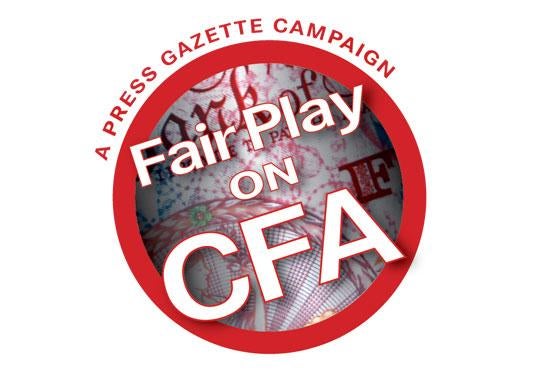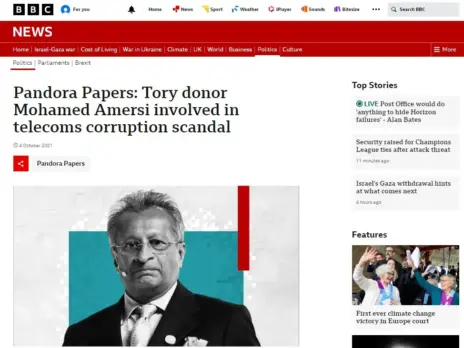
The use of conditional fee agreements in libel cases is preventing the press from acting as a “public watchdog” and is incompatible with human rights law, a new report has found.
The study by the Centre for Socio-Legal Studies at the University of Oxford, which was commissioned by Associated Newspapers, concluded that the so-called “no-win no-fee” system led to self-censorship in news organisations.
It argued that although the CFA scheme in England and Wales gave access to justice for people who would otherwise have not been able to afford legal action, the costs associated with defending a libel claim were disproportionate to the damages awarded.
These costs, the report said, were hundreds of times higher than in other European countries and were encouraging newspapers to settle libel claims out of court to avoid defending a story.
“CFA acts as a catalyst, forcing media outlets to settle claims, resulting in a self-imposed restraint on media outlets,” the researchers at Oxford said.
“Such restraint is imposed irrespective of journalistic standards and shackles the media outlets’ important role as a ‘public watchdog’.”
The report found that the no-win no-fee system interfered with journalists’ right to freedom of expression under Article 10 of the European Convention of Human Rights.
It also argued that CFAs might breach Article 6 – covering the right to a fair trial.
‘By far the most expensive’
Even without a no-win no-fee agreement, the cost of defending a libel claim in England and Wales was found to be up to 140 times higher than the average of 11 other European countries compared in the report.
The 12 European countries examined were: Belgium, Bulgaria, Cyprus, England/Wales, France, Germany, Ireland, Italy, Malta, Romania, Spain and Sweden.
The researchers working on the Oxford report created two libel claim scenarios and asked lawyers in each of 12 countries how they would be handled and the likely damages and costs.
In one of these scenarios, damages in England and Wales were estimated at £62,500, compared with £10,500 in France and £3,000 in Germany.
The claimant’s legal costs on a conditional fee agreement – based on a trial lasting between two and three weeks – were estimated at £3.25m.
This compared with estimates of £867,000 in Ireland, £46,000 in France and a mere £1,050 in Germany.
The report said that, in this case, the media organisation being sued could save up to 60 times the amount claimed in damages by settling before going to court.
“The conclusion is irrefutable,” the report said. “England and Wales is by far the most expensive jurisdiction in which to conduct defamation proceedings.
“In no other jurisdiction is the incentive to settle pre-trial so strong for a defending media outlet.”
Lengthy trials
The report found that England and Wales was the fastest jurisdiction to go through writ to judgment – in Belgium, Cyprus, Ireland, Italy, Romania and Spain it might take more than five years.
But the average amount of time spent in court arguing the case was higher than any other country – and the researchers were not sure why.
A trial that might take less than a day in some European countries would take between 14 and 21 days in England and Wales, they found.
The costs were further ramped up by the number of lawyers involved – between four and six – compared with the same trial in France and Belgium which would have required just two.
The report said this was partly due to the tradition in England and Wales of splitting the legal profession in two – with solicitors dealing with the litigation outside court and barristers before the court.
‘Some justice’
Press Gazette has been campaigning for a fairer system for news organisations faced with excessive success fees which can deter them from fighting legitmate stories in the public interest.
Justice minister Bridget Prentice has convened a panel of senior academics to investigate whether CFAs are “still operating in the best interests of giving people access to justice”.
Giving the keynote lecture at the Society of Editors conference in Bristol last November, Daily Mail editor Paul Dacre asked: “Can it really be right for a QC in a libel case to be paid £7,000 for a day in court whilst the same QC, prosecuting or defending a serious case at the Old Bailey, may receive less than £600 a day – less than a tenth?
“Today, newspapers – even wealthy ones like the Mail – think long and hard before contesting actions, even if they know they are in the right, for fear of the ruinous financial implications.
“For the provincial and local press, such actions are now almost certainly out of the question. Instead, they stump up some cash, money they can’t afford, to settle as quickly as possible, to avoid court actions – which, if they were to lose, could, in some cases, close them. Some justice.”
• Editor’s comment: CFAs are now economic life and death for the media
• Read the report in full (PDF)
Email pged@pressgazette.co.uk to point out mistakes, provide story tips or send in a letter for publication on our "Letters Page" blog







